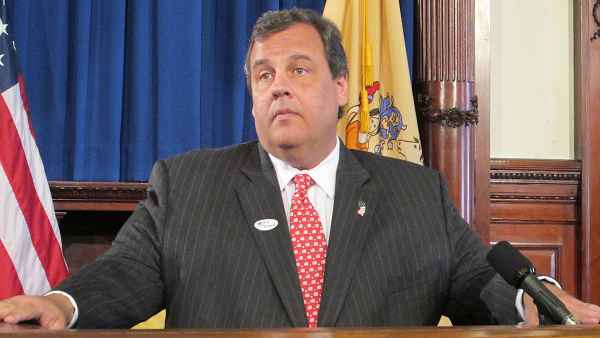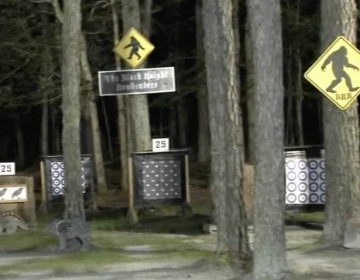NJ Pension crisis 101: Where things stand in March 2015

(Phil Gregory/for NewsWorks)
Gov. Chris Christie has been trying to generate support in recent weeks for the sweeping changes to public-employee benefits that he laid out during his budget address last month.
He’s raising the issue regularly during town hall-style events, and his office has also been sending out near-daily emails and social-media posts highlighting the cost of employee pensions and health benefits.
But it’s an idea that the governor hasn’t been giving the hard sell that could catch on with the Democrats — and appears to have done just that with one of the party’s leaders.
The Republican governor has hardly been shy about most of his budget proposals. He wants to freeze the current public-employee pension system and create a new, less-generous retirement plan with some features of a 401(k). He’s also seeking to save money by making employee health coverage less generous.
So far, those ideas have not been embraced by the Democratic leaders who would need to cooperate with the governor to implement his plan. But it’s another idea that Christie has talked about much less that one of those leaders says could be a winner.
Christie’s $33.8 billion budget for the fiscal year that begins July 1 proposes changing the goal for getting up to full state funding of the annual pension payment required by actuaries from seven years to 10 years.
And the $1.3 billion pension contribution Christie has incorporated into his proposed budget would equal three-tenths of what actuaries say the state should be paying on an annual basis to ensure the solvency of the pension system, which covers the retirements of roughly 773,000 current and retired employees.
Assembly Speaker Vincent Prieto (D-Hudson) said in an interview with NJ Spotlight that he’s also been talking about stretching out the period to reach full funding given state tax collections in recent years have not measured up to Christie’s revenue projections.
Though lawmakers have sought to raise revenue in other ways, Christie has rejected their ideas and simply cut the pension contribution instead.
“I think it is something to look at,” Prieto said. “We can look at spreading it out so it gives us a little bit of time.”
“It may give us the opportunity for our revenues to catch up,” he said.
Years of underfunding the annual pension payment by Christie and five prior governors have left the system with a huge unfunded liability. The latest estimates of that gap range between $37 billion and $83 billion depending on which accounting standard is applied.
A new study from the National Association of State Retirement Administrators put New Jersey in last place among the 50 states when it came to meeting the employer contribution required by actuaries on an annual basis from 2001 to 2013. The state contributed just 38 percent of what the actuaries said it should have over that period, according to the study.
To help address the funding gap, a bill Christie signed into law in 2010 established a seven-year phase-in period for the state to reach the full contribution calculated by actuaries. A year later Christie signed into law other reforms, including a requirement that employees contribute more toward their pensions.
Two of the budgets Christie wrote after he enacted the reform laws started the seven-year phase-in — a $484 million contribution during the 2012 fiscal year and a $1.03 billion contribution during the 2013 fiscal year.
But Christie scaled back the next installment, a planned $1.57 billion contribution during the 2014 fiscal year, to $697 million to solve significant budget problems that year. And his budget for the current fiscal year includes just $681 million for the pension system, not the $2.25 billion that would represent the fourth installment under the seven-year phase-in schedule.
Public worker unions have sued the state over those smaller-than-promised payments, and a judge ruled last month that the governor and lawmakers need to come up with another nearly $1.6 billion to reach the full four-sevenths contribution. Christie’s spokesman has said he is appealing the court decision.
The $1.3 billion payment Christie is proposing as part of his shift to the 10-year phase-in schedule is far less than the roughly $3 billion contribution that would be required if the state stuck with the seven-year schedule.
A spokesman for the state Department of Treasury referred to the section of the budget booklet that explains the administration’s proposed shift when asked for comment on the pension contribution yesterday.
The booklet says the change to one-tenth increments would “help ensure the long-term solvency and stability of the pension systems.”
“A regular schedule starting at three-tenths that increases annually in a return to full funding of the actuarial-determined contribution will ensure that long-term solvency, health and stability of the pension systems,” the budget booklet says.
Prieto, in the interview, said Christie’s proposal makes senses given employees have been making the bigger contributions toward their pensions.
“We made the reforms, now he have to try and fund it,” Prieto said. “Maybe this gives us that opportunity.” But less open to Christie’s proposal to spread pension funding over a 10-year period is Senate President Stephen Sweeney (D-Gloucester).
Sweeney told NJ Spotlight he thinks the state should increase the income tax rate on earnings over $1 million to generate more money for the pension contribution. He’s also proposed reducing the funding goal for the actuarial calculation from 100 percent to 85 percent, a standard that’s acceptable in the private sector and may be easier for the state to get to.
“For me, three-tenths, if it continues you going in a downward direction, than no, it’s not good,” Sweeney said. Neither leader is talking seriously right now about implementing Christie’s broader plans to freeze the pension system or reduce employee health benefits to achieve more savings.
“If he had lived up to his end of the agreement and made the payments, he has every right to stand up and say ‘We need to this or we need to do that,’” Sweeney said. “But he didn’t do it.”
______________________________________________________
NJ Spotlight, an independent online news service on issues critical to New Jersey, makes its in-depth reporting available to NewsWorks.
WHYY is your source for fact-based, in-depth journalism and information. As a nonprofit organization, we rely on financial support from readers like you. Please give today.




